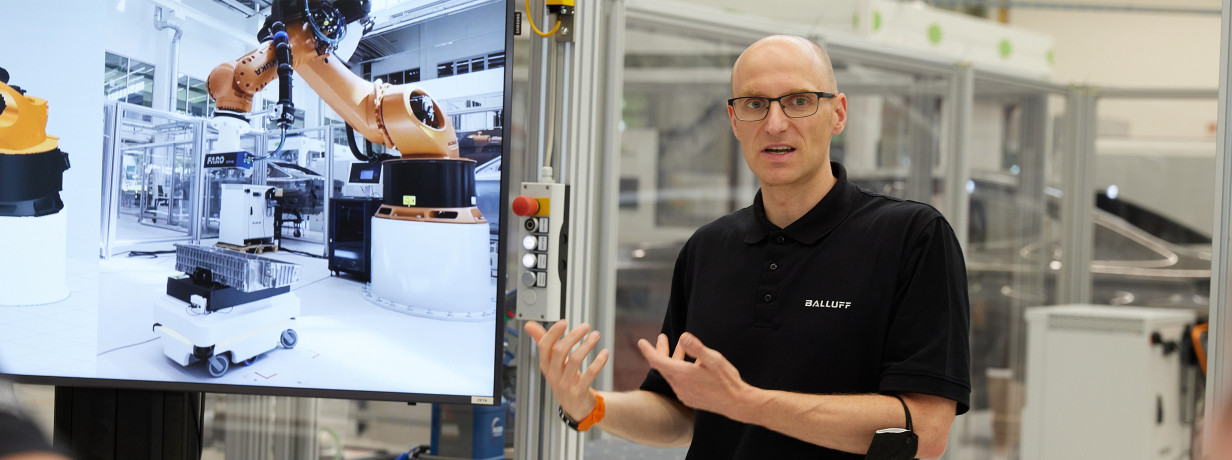10.11.2022
Eyes on what’s important
Since 2020, Balluff has been developing new business ideas in true start-up fashion in Strategic Incubation Programs, relying on speed and a consistent customer focus for innovation management.

It all starts with a concrete problem that has not yet been solved using existing automation solutions. Based on this issue, the Strategic Incubation Program (SIP) teams develop a use case, value propositions, and a potential business model.
Lean Startup method
The teams follow the Lean Startup method, which focuses on speed. But not only that: The members of the team are selected according to the required skills and works together flexibly. The method thrives on regular feedback. This enables the teams to continuously improve their working methods and thus their individual projects, but also the innovation program as a whole. The focus is on individual competencies and continuous exchange with the customers.
Making the cut
After the program kicked off in 2020, a total of seven teams with seven ideas entered the race. "We exchange ideas with potential customers on several occasions. This is how we increase the benefit of our solutions’ value proposition," explains Dr. Roland Schaefer, Vice President Innovation at Balluff. This can also lead to an idea being shelved altogether. Only if a solution still meets the customer's requirements in the iterative further development process will it be pursued. Today, four of the original seven ideas are already on the market.
“The SIPs provide great freedom within the company, which is used to complete tasks faster and more efficiently.”
Thomas Meißner, Strategic Incubation Manager at Balluff
Establishing new working methods
“The SIPs make us faster, more agile, and strengthen communication across business units and departments. We have learned a lot,” says Schaefer. The SIPs introduce new working methods and apply them in the individual programs. If they prove successful there, the new methods also radiate out into the organization as a whole. If the expected improvement does not materialize, the new approach is discarded before a company-wide roll-out—which would tie up considerable resources. The core business remains unaffected. This approach also enables established companies to test new methodologies in practice and to burden the overall organization only with those activities that result in significant improvements.
Developing new business models
Since the ideas are tested in the market at an early stage and together with the customers, market analysis plays an important role. Which markets show which potentials is analyzed in a structured manner from the very beginning. With the product launch, the company is already well positioned in the promising markets. New ideas also require new business models that make entering new markets possible in the first place. The innovative hardware and software solutions open up opportunities for new business models such as license sales or rental models. They are developed in parallel with existing models in the SIPs and, if successful, can be transferred to standard products using the knowledge already gained.
Positive results
Balluff is happy with the program, which is why it will be continued. Since September 2022, another team led by Strategic Incubation Manager Daniel Bstieler has been working on a new idea—the Liquid Monitoring System. "The system is designed to continuously monitor the quality of liquids," says Bstieler, describing the basic idea. Possible examples include the monitoring of lubricants in industrial applications or other liquids such as beverages or wastewater. Continuous monitoring could, for example, help to optimize the consumption of lubricants in line with demand, ensure the consistent quality of beverages, or monitor compliance with legal limits in water treatment. "The Liquid Monitoring System can make an important contribution when it comes to sustainability," says Bstieler.
 At this year's Balluff Management Meeting, the SIPs had the change to present their projects in the ARENA2036.
At this year's Balluff Management Meeting, the SIPs had the change to present their projects in the ARENA2036.
High transparency
“SIPs work very transparently. This allows an objective assessment of the development and expected market success of new products or business models. Decisions are based on facts, not intuition," says Schaefer, adding that changes would also occur within the entire company when different departments are involved in the work of the SIPs. "SIPs are very fast and agile. This requires central departments to work flexibly, competing with their 'regular' activities. Such complex projects require a high level of management awareness," Schaefer points out.
Freedom to focus on what’s important
“The SIPs provide great freedom within the company, which is used to complete tasks faster and more efficiently. The team works towards a fixed goal, but remains flexible at the same time," adds Thomas Meißner, Strategic Incubation Manager at Balluff. "The regular feedback from customers and the reports on project progress also help the teams focus on what’s important."
